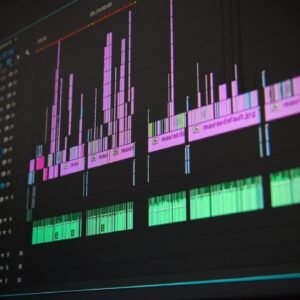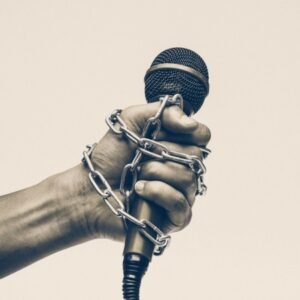This blog post intends to answer the question is listening to music bad for your ears, and of course aid you in finding the right headphones for your music needs. We’ll look at both short and long term effects and explore some of the things you can do to minimize the effect earbuds have on your hearing.
In this article, I will talk about “Is Listening To Music Bad For Your Ears”. Let’s start.
Watch The Volume
Listening to loud music can be dangerous. It can cause hearing loss, tinnitus, and damage to your inner ear.
The louder the sound, the more likely you are to damage your ears. But it’s not just about volume. A sudden burst of noise at a high pitch can be just as damaging as sustained low-level noise.
Keep these tips in mind when listening to music:
Watch the volume – Louder isn’t always better. If you’re using headphones or earbuds, keep them turned down so they don’t play too loud. And never turn up the volume so that others nearby can hear what you’re listening to.
Use protective gear – If you use earbuds or headphones at work or during sports activities, use protective gear such as foam earplugs or earmuffs (available at hardware stores). They block out noise while allowing you to hear other sounds around you, like traffic or people talking to you.
Turn off all distractions – Make sure that you don’t have any distractions when playing music at home or in your car so that you’re not tempted to turn up the volume on your stereo system or car stereo system even more than necessary for maximum enjoyment of your favorite tunes!

Take Precautions
Listening to music through earbuds or headphones is a great way to enjoy your favorite tunes. But it’s also important to take precautions when you listen to loud music, especially if you’re listening for long periods of time. The longer you listen at loud volumes, the more likely you are to develop hearing loss.
Some people may find it difficult to tell when the volume has become too loud. So, if you have any doubt about whether your music is too loud, take precautions:
Turn down the volume and limit your use of headphones or earbuds.
If possible, use a noise-canceling headset or earbuds so that you don’t need to turn up the volume as high just to hear over background noise like traffic or other people talking.
Buy a pair of noise-canceling headphones (or use some foam earplugs) if you’ll be using your regular headphones in an environment where there’s a lot of background noise (like an airplane).

FAQs for Is Listening To Music Bad For Your Ears
Now that you understand “Is Listening To Music Bad For Your Ears”, let’s move on to the FAQ section.
Does Listening To Music Damage Your Ears?
Listening to music is a wonderful, pleasurable experience. But it’s also something that can be harmful to your hearing if you’re not careful.
There are several ways that listening to music can damage your ears. The most obvious way is by playing your music too loudly. If you turn up the volume on your stereo or headphones and you can hear the music distorting or crackling, then you’re playing it too loud.
Another way that listening to music can damage your hearing is if you have headphones on while riding in a car or bus, where there is a lot of city noise. This can cause a type of hearing loss called “reverberation.” The noise bounces around in your head and can damage your ears over time.
Listening to music with ear buds is another thing that you should be careful about because they put more pressure on your eardrums than regular headphones do and they don’t block out background noise as well as regular headphones do so they put more strain on your eardrums when there’s loud background noise around you.
How Can I Listen To Music Without Damaging My Ears?
Listening to loud music can damage your ears, but there are ways to protect them.
Listening to music on a regular basis can be a great way to relax and unwind at the end of a busy day. But if you listen to loud music too much, it can damage your hearing.
Loud sounds (like music) cause permanent damage by overstimulating the tiny hair cells in the inner ear that send signals to the brain. If those hair cells are damaged, they can’t send signals properly anymore. This is called hearing loss.
If you’re always listening to loud music, it’s easy for your ears to get damaged without you even realizing it. A lot of people think that if they can’t hear any ringing in their ears after listening to loud music, then their hearing is fine and nothing is wrong. However, this isn’t always true — sometimes you don’t realize how much damage has been done until later on down the line when it’s too late.
Is Listening To Music Everyday Bad?
Listening to music is a great way to relax and unwind, but it can also be bad for your ears.
Listening to music at loud volumes can damage your hearing over time. It’s common for people to listen to their iPods at full volume, especially when they’re exercising or in the car.
But listening to music at high volumes can damage your ears even if you’re not exercising or driving. The louder the volume, the more damaging it becomes.
The amount of time you spend listening to music also affects how much damage it does. If you’re spending hours a day listening to music at high levels, then it’s likely that you’ll have some hearing loss over time. But if you’re just listening occasionally, then there’s no need to worry about damaging your ears from passive exposure.
Listening to music is one of the most common activities in the world. People listen to music for many reasons, such as for entertainment, to relax, or even just to block out other sounds. But what you may not know is that listening to loud music can actually be bad for your ears.
The human ear is an amazing organ that can hear an incredibly wide range of sounds. However, it is also sensitive and can be damaged by loud noises. This is because sound travels through the ear canal and hits the eardrum, which vibrates from the impact. The movement of the eardrum causes vibrations in three tiny bones in your middle ear (the hammer, anvil and stirrup). These vibrations then travel through a small canal into your inner ear where they are converted into nerve impulses that travel through your auditory nerve and into your brain where they are interpreted as sound.
According to experts, if something blocks off all external noise or if you turn up the volume on your stereo too high, then you can damage your hearing permanently over time.
Is It Bad To Listen To Music For Long Hours?
No, it’s not bad to listen to music for long hours.
Listening to music is a great way to relax and unwind after a stressful day. However, if you listen to music at very high or very low volumes, then it can damage your hearing.
Listening to loud music can cause noise-induced hearing loss, which is permanent and irreversible. The same goes for listening to very loud sounds like an explosion or a gunshot — this could cause temporary hearing loss (tinnitus) or even permanent hearing loss.
To prevent these problems, always turn down the volume on your device so that it doesn’t reach more than 70% of its maximum capacity. If you’re using earbuds, make sure that they fit snugly into your ears so that sound doesn’t escape easily. Also, try not to listen for too long periods of time — even if your device is turned down low, it can still be damaging if you are exposed for too long (source).
What Happens If I Listen To Music Too Much?
Our ears are wonderful organs. They allow us to enjoy music, hear our loved ones and communicate with the world around us. But what happens if you listen to music too much?
How Music Affects Your Hearing
Music can damage your hearing in two ways:
Acoustic trauma: This occurs when sound waves cause physical damage to the eardrum or other parts of the ear. The louder and longer the sound is, the greater the risk of acoustic trauma.
Tinnitus: This is a ringing or buzzing in your ears that’s often caused by exposure to loud noises over time. It can be temporary or permanent, depending on how long and how loud you were exposed to noise.
While it may not seem like a big deal, listening to music too much can lead to hearing loss. Listening to loud music for an extended period of time can cause damage to the hair cells in your cochlea, which transmit sound from your eardrum to your brain.
The louder the volume, the more likely you are to experience damage. If you’re going out tonight and intend on listening to music at a noisy bar or club, be sure to wear earplugs or earmuffs.
Some people claim that they feel like their ears are ringing after listening to loud music for long periods of time, but this feeling is temporary. If you experience persistent ringing in your ears after listening to loud music, be sure to consult a doctor.
You should also avoid using headphones that don’t fit properly or aren’t designed for your specific type of device (such as an iPod). Headphones that don’t fit properly can become uncomfortable after prolonged use and may cause damage over time due to poor sound quality or excessive volume levels.
Can You Go Deaf From Headphones?
Can you go deaf from headphones?
No, you cannot go deaf from listening to headphones.
You can, however, permanently damage your hearing if you listen to loud music through headphones for several hours each day.
The reason is that prolonged exposure to noise above 85 decibels (dB) can cause permanent damage to the delicate hair cells in the inner ear. Even if they do not cause an immediate problem, these hairs can be damaged permanently over time and may even lead to hearing loss later in life.
The louder the sound, the less time it takes for damage to occur. Listening to music at a high volume for one hour per day is not considered dangerous, but doing so every day over a long period of time could result in permanent hearing loss.
Many people enjoy listening to music on headphones or earbuds, but how safe is it? Can you go deaf from headphones? The short answer is no. Going deaf from headphones is highly unlikely, and most of us will never experience any hearing loss at all.
The reasoning behind this assumption is that we are exposed to loud noises on a daily basis. If that were enough to damage our ears, we would all be deaf by now.
In fact, some studies have shown that listening to music on average-volume headphones could actually protect your hearing from other loud noises. It’s also important to note the difference between the volume at which you listen to music and very loud noises like gunshots or fireworks. We’re talking about exposure over time here — not just one momentary exposure to a loud sound.
Conclusion for Is Listening To Music Bad For Your Ears
It is true that the long-term exposure to loud music can result in certain hearing problems. The good news is, most studies also show that people recover from these problems if they give their ears a break from loud music. But for those who are in noisy environments for extended periods of time, it’s absolutely necessary to use protection — earplugs or earmuffs, for example.
Thank you for reading, and I hope you get the point of “Is Listening To Music Bad For Your Ears”. If not, please contact me or leave a comment below. I would be pleased to help in any way I can.




